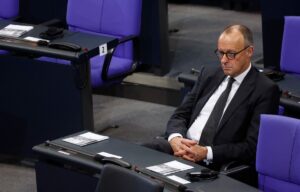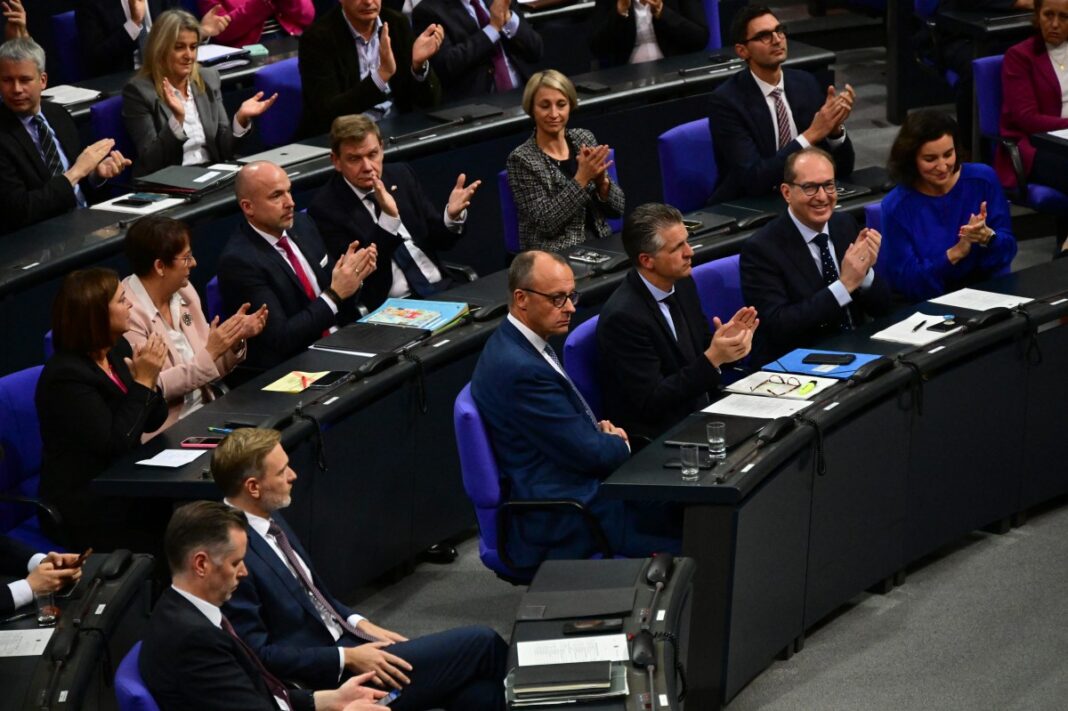Yasemin Aydın*
On Nov. 6, political tremors reverberated on both sides of the Atlantic. In the United States, Donald Trump’s reelection signaled a new wave of isolationism. In Germany, the coalition government collapsed, leaving the country poised for early elections. That same day, Friedrich Merz, the leader of Germany’s Christian Democratic Union (CDU) and its likely next chancellor, stood on stage in Berlin at the Hertie School, discussing Europe’s future.
Merz’s vision for Europe is bold: a stronger EU, greater economic competitiveness and strategic autonomy in defense and energy. His proposals reflect his pragmatism and his deep understanding of European structures, honed during his time in the European Parliament in the 1990s. Yet Merz’s rise also highlights a critical tension at the heart of European politics: Can leaders counter rising populism and nationalism without legitimizing their rhetoric?
This question is central to Europe’s future. The European Union has always been more than an economic or security alliance; it is a shared project of unity, diversity and democracy. Merz’s leadership offers both promise and peril for this fragile identity.
Merz’s Vision: Strengthening Europe
At the Hertie School, Friedrich Merz outlined his vision for Europe, emphasizing three key priorities: economic competitiveness, strategic sovereignty and cautious fiscal flexibility.
He stressed the need to revitalize Europe’s single market, which he called the EU’s greatest achievement. Merz supports reducing regulations, expanding free trade agreements and deepening capital market integration to attract global investment. In the energy sector, he advocates for cross-border cooperation to lower costs and strengthen Europe’s independence from external suppliers.
On strategic sovereignty, Merz aligns with French President Emmanuel Macron in urging Europe to reduce its reliance on the United States for defense and security. He supports consolidating the European defense industry and creating a unified market to position the EU as a global player in security policy.
For his third priority, Merz emphasized cautious fiscal flexibility. While critical of EU debt-sharing mechanisms, he expressed a willingness to fund critical infrastructure and defense projects. This balanced approach sets him apart from more rigid fiscal conservatives in his party.
Merz’s pragmatic focus on economic and structural reform appeals to many who see Europe as unprepared for today’s geopolitical challenges. But his vision risks neglecting the social and cultural dimensions of the European project — issues that are equally crucial to its survival.
The Populist Drift: A Flawed Response to Nationalism
Merz’s past reliance on far-right rhetoric complicates his ability to unify Europe. His controversial call to close Germany’s borders to most asylum seekers after the Solingen attack, for example, reflected a willingness to adopt populist tactics to address voter anxieties. While such positions may have short-term appeal, they risk legitimizing extremist narratives and alienating the political center.
This approach is not unique to Merz. Across Europe, mainstream leaders have attempted to neutralize the far right by adopting elements of its rhetoric, only to find themselves outflanked by more radical voices. Populism thrives on emotional resonance and simplified solutions. Countering it requires presenting alternative narratives that are just as compelling and accessible.
Merz has yet to demonstrate this ability. His focus on pragmatic policies — however well-reasoned — fails to address the deeper identity questions that drive political polarization. Europe needs leaders who can tell a story of unity and diversity, emphasizing shared values rather than divisions.
The Challenge of Diversity
One of the most pressing tests for Merz will be his approach to diversity. Europe’s identity has always been rooted in its ability to unite different cultures, languages and histories under shared principles. Yet Merz often frames migration and cultural pluralism as challenges rather than opportunities, reinforcing the narratives of those who see diversity as a threat.
Diversity is not just a moral value — it is a strategic asset. Europe’s multiculturalism enhances its ability to innovate, adapt and engage with a globalized world. Ignoring this strength risks alienating younger Europeans, for whom inclusion and human rights are non-negotiable.
Merz must recognize that building a cohesive European identity requires celebrating diversity, not sidelining it. His reluctance to fully embrace this truth risks undermining the very unity he seeks to strengthen.

Reclaiming Europe’s Narrative
To succeed as a European leader, Merz will need to reclaim the narrative of Europe’s identity. This means articulating a vision that resonates emotionally with citizens across the continent, not by mirroring the language of populists but by offering a hopeful alternative.
For instance, migration could be reframed as a source of renewal and innovation rather than a crisis. The EU itself could be portrayed not as a bureaucratic machine but as a safeguard against global instability. These narratives require imagination and courage —qualities that Merz has yet to fully demonstrate.
The EU embodies deeply appealing values: cooperation, peace and shared prosperity. Leaders like Merz must find ways to make these values tangible and relatable, countering the fear-based narratives that dominate populist discourse.
Europe’s Identity at a Crossroads
Friedrich Merz’s rise comes at a critical moment for Europe. His pragmatic approach to economic and defense policy positions him as a capable leader for addressing structural challenges. However, his reliance on divisive rhetoric in the past and his limited focus on diversity undermine his ability to inspire a broader, more inclusive vision of Europe.
The stakes are high. Europe is more than a collection of markets or defense agreements; it is a community of shared values. Unity and diversity are not contradictions — they are the foundation of Europe’s strength.
As Merz prepares to lead, the question is whether he can rise above the populist drift and articulate a vision that unites Europe’s citizens around its core principles. If he succeeds, he could help Europe navigate its identity crisis and emerge stronger on the world stage. If he fails, the consequences will ripple far beyond Germany’s borders.
For Europe, the choice is clear: leaders must fight for its soul, not by mirroring its divisions but by championing its shared humanity.
*Yasemin Aydın is a social anthropologist and social psychologist in Germany.
